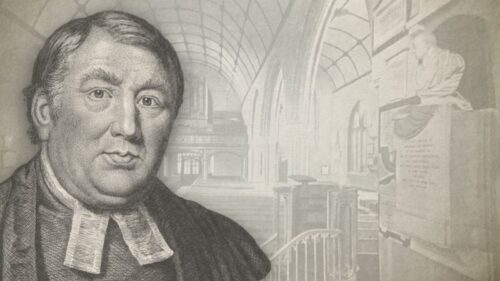
March 1—Morning Devotion
“And his name shall be called Wonderful.”—Isaiah 4:6
In the opening of the last month, the fragrancy of Jesus’s name, as Emanuel, gave a sweet savour to my soul. May He, whose name is as ointment poured forth, give a new refreshment to my spiritual senses this morning, in this name also as Wonderful; for surely every thing in him, and concerning him, of whom the prophet speaks, is eminently so. But who shall speak of thy wonders, dearest Lord! the wonders of thy Godhead, the wonders of thy manhood, the wonders of both natures united and centered in one Person? – Who shall talk of the wonders of thy work, the wonders of thine offices, characters, relations; thy miraculous birth, thy wonderful death, resurrection, ascension? – Who shall follow thee, thou risen and exalted Saviour, at the right hand of power, and tell of the exercise of thine everlasting priesthood? Who shall speak of the wonders of thy righteousness, the wonders of thy sin-atoning blood? What angel shall be found competent to proclaim the wonders of the Father’s love, in giving thee for poor sinners? What archangel to write down the wonders of thy love, in undertaking and accomplishing redemption? And who but God the Spirit can manifest both in the height, and depth, and breadth, and length, of a love that passeth knowledge? Is there, my soul, a wonder yet, that, as it concerns thee, and thine interest in him, whose name is wonderful, is still more marvellous to thy view? Yes, Oh thou wonderful Lord, for sure all wonders seem lost in the contemplation compared to that, that Jesus should look on me in my lost, ruined, and undone estate; for his mercy endureth for ever. Well might Jesus say, “Behold, I and the children whom thou hast given me, are for signs and wonders!” Isa. viii. 18. Well might the Lord, concerning Jesus and his people, declare them to be as men wondered at. Zech. iii. 8. And blessed Lord, the more love thou hast shewn to thy people, the more are they the world’s wonder and their own. Precious Lord, continue to suprise my soul with the tokens of thy love. All the tendencies of thy grace, all the manifestations of thy favour, thy visits, thy love-tokens, thy pardons, thy renewings, thy morning-call, thy mid-day feedings, thy noon, thy evening, thy midnight grace – all, all are among thy wonderful ways of salvation; and all testify to my soul, that thy name, as well as thy work, is, and must be, wonderful.
Robert Hawker (1753-1827) was an Anglican (High-Calvinist) preacher who served as Vicar of Charles Church, Plymouth. John Hazelton wrote of him:
“The prominent features…in Robert Hawker's testimony…was the Person of Christ….Dr. Hawker delighted to speak of his Lord as "My most glorious Christ.” What anxious heart but finds at times in the perusal of the doctor's writings a measure of relief, a softening, and a mellowing? an almost imperceptible yet secret and constraining power in leading out of self and off from the misery and bondage of the flesh into a contemplation of the Person and preciousness of Christ as "the chiefest among ten thousand and the altogether lovely." Christ and Him crucified was emphatically the burden of his song and the keynote of his ministry. He preached his last sermon in Charles Church on March 18th, 1827, and on April 6th he died, after being six years curate and forty-three years vicar of the parish. On the last day of his life he repeated a part of Ephesians 1, from the 6th to the 12th verses, and as he proceeded he enlarged on the verses, but dwelt more fully on these words: "To the praise of His glory Who first trusted in Christ." He paused and asked, "Who first trusted in Christ?" And then made this answer: "It was God the Father Who first trusted in Christ."
Robert Hawker on the Biblical Covenants (Complete)
Robert Hawker's Poor Man's Morning Portions





